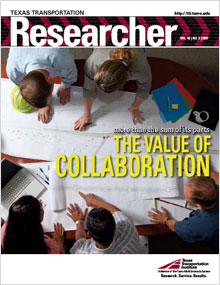Pipeline networks around the world are a vital part of our global infrastructure. Pipelines stretch across more than 1.5 million miles in the U.S. alone, so ensuring they remain an effective means for transporting fuel is a full-time job. As it strives to maintain and improve the safety of the world’s pipelines, Pipeline Research Council International (PRCI), Inc., has begun working with the Texas Transportation Institute (TTI) to enhance its research initiatives.
PRCI is an international, nonprofit corporation made up of pipeline companies, manufacturers and service companies that fund pipeline research deemed vital to the industry. As the research arm of the pipeline industry, PRCI focuses on finding near-term reliable solutions to pipeline problems, especially those involving issues of safety in design and operation. At a time when rising energy prices are a worldwide concern, the significance of PRCI’s work has never been greater.
“Our focus—and funding—are toward the research itself,” explains Scott Thetford, PRCI’s director of pipeline programs, “but we often need support services to make that research useful. When we sought a partner to fill that need, TTI was at the top of the list.”
TTI’s expertise in the area of pipeline research recently helped it secure a federal grant to support start-up operations for its National Pipeline Safety and Operations Research Center. Pipelines are sometimes overlooked as an area of transportation research, and the center—a partnership with New Mexico State University—represents TTI’s commitment to broadening its knowledge base in that area. Partnering with PRCI gives TTI prospects for research, and those opportunities will benefit our nation and the world as they lead to more efficient, safer and longer-lasting pipelines.
What led PRCI to TTI’s door was the wide range of support services offered by the Institute. TTI’s project management, network support and communications expertise are helping PRCI manage its research program and implement its findings. This allows PRCI to focus on carrying out the research itself, while TTI supports ancillary activities—like managing the corporate website, transferring technology through print and other media and assisting with the day-to-day requirements of project management.
As the two organizations settle into a close partnership, both are keenly aware of the significant opportunities one offers the other. “It’s truly a symbiotic relationship,” observes Steve Roop, director of TTI’s National Pipeline Safety and Operations Research Center. Associate Research Scientist Les Olson, TTI’s liaison with PRCI, adds, “We provide support services for their research needs, and they provide research opportunities for our center.” Recently, in fact, New Mexico State submitted a research proposal, which is currently under consideration by PRCI.
“It may sound like a cliché, but you always want to dance with the prettiest girl at the ball,” observes Thetford. “TTI’s reputation for excellence, research expertise, and support capabilities certainly caught our eye. We look forward to conducting many years of innovative research together.”
